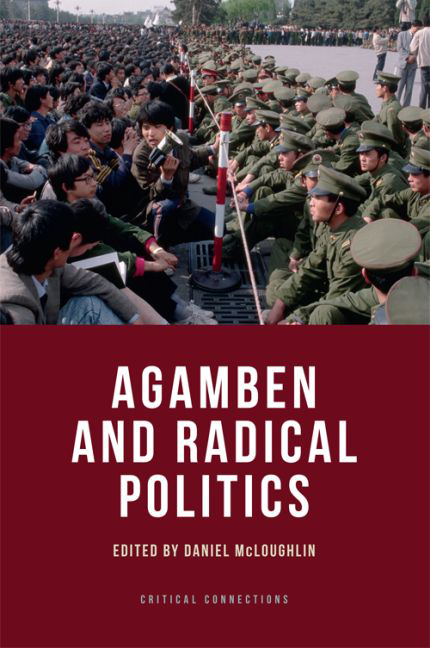Book contents
- Frontmatter
- Contents
- Acknowledgements
- Introduction: Agamben and Radical Politics
- 1 Capitalism as Religion
- 2 Glory, Spectacle and Inoperativity: Agamben's Praxis of Theoria
- 3 On Property and the Philosophy of Poverty: Agamben and Anarchism
- 4 ‘Man Produces Universally’: Praxis and Production in Agamben and Marx
- 5 Liturgical Labour: Agamben on the Post-Fordist Spectacle
- 6 An Alogical Space of Genetic Reintrication: Notes on an Element of Giorgio Agamben's Method
- 7 Zoē aiōniōs: Giorgio Agamben and the Critique of Katechontic Time
- 8 Agamben, Badiou and Affirmative Biopolitics
- 9 Form-of-Life and Antagonism: On Homo Sacer and Operaismo
- 10 What Is a Form-of-Life?: Giorgio Agamben and the Practice of Poverty
- 11 Law and Life beyond Incorporation: Agamben, Highest Poverty and the Papal Legal Revolution
- Notes on Contributors
- Index
4 - ‘Man Produces Universally’: Praxis and Production in Agamben and Marx
Published online by Cambridge University Press: 23 September 2017
- Frontmatter
- Contents
- Acknowledgements
- Introduction: Agamben and Radical Politics
- 1 Capitalism as Religion
- 2 Glory, Spectacle and Inoperativity: Agamben's Praxis of Theoria
- 3 On Property and the Philosophy of Poverty: Agamben and Anarchism
- 4 ‘Man Produces Universally’: Praxis and Production in Agamben and Marx
- 5 Liturgical Labour: Agamben on the Post-Fordist Spectacle
- 6 An Alogical Space of Genetic Reintrication: Notes on an Element of Giorgio Agamben's Method
- 7 Zoē aiōniōs: Giorgio Agamben and the Critique of Katechontic Time
- 8 Agamben, Badiou and Affirmative Biopolitics
- 9 Form-of-Life and Antagonism: On Homo Sacer and Operaismo
- 10 What Is a Form-of-Life?: Giorgio Agamben and the Practice of Poverty
- 11 Law and Life beyond Incorporation: Agamben, Highest Poverty and the Papal Legal Revolution
- Notes on Contributors
- Index
Summary
In The Kingdom of the Glory, in the midst of outlining what he sees as a specifically Christian account of governing as constant praxis, Giorgio Agamben turns his attention to a text that has preoccupied him for several decades: the Economic and Philosophic Manuscripts of Karl Marx. Beginning with his first book, The Man without Content, Agamben has repeatedly ignored Louis Althusser's suggestion that ‘Marx's early works do not have to be taken into account’ and turned to the Paris Manuscripts in the course of formulating his own accounts of praxis and of history. Indeed, references to Marx in Agamben's texts can be found as early as his first published essay, ‘On the Limits of Violence’, in which he defends Marx from the charge that his radical transformation (or Aufhebung) of man and nature relies on a form of historical Darwinism ‘which configures History as a linear progression of necessary laws, similar to the laws governing the natural world’. These themes – non-linear history and ‘human nature’ – are ones to which Agamben returns repeatedly in subsequent decades. And, again and again, he is drawn to the 1844 Manuscripts, in which he finds an account of praxis as that which ‘founds the unity of man with nature, of man as natural being and man as human natural being’.
When Agamben returns to Marx in The Kingdom and the Glory, however, he dismisses him in a mere paragraph as a thinker who has secularised the Christian conception of the being of creatures as divine praxis. As the theologian Augustine articulated this, the being of creatures utterly depends on the continuous praxis of God, to the point of being indistinguishable from it. Referring to the Economic and Philosophic Manuscripts, in which the young Marx pronounced the ‘rich, living, sensuous, concrete activity of self-objectification’ to be the true essence of man, Agamben writes:
After having conceived of being as praxis, if we take God away and put man in his place, we will consequently obtain the result that the essence of man is nothing other than the praxis through which he incessantly produces himself.
Here, Marx stands accused of secularising a theological account of praxis: in conceiving the ‘being of man as praxis and praxis as the self-creation of man’, Marx places man in the empty space of the creator God.
- Type
- Chapter
- Information
- Agamben and Radical Politics , pp. 71 - 90Publisher: Edinburgh University PressPrint publication year: 2016



